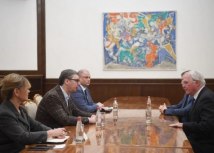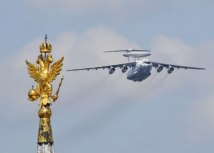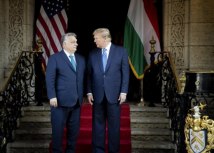An army for Kosovo?
The International Crisis Group has issued a report with recommendations for Kosovo's independent army forces
International Crisis GroupExecutive summary and recommendations
The international community is just months away from decisions that are expected to make Kosovo a state, but planning for the security ramifications has not kept pace. It must avoid creating a weak state; the future Kosovo needs adequate institutions to ensure the rule of law and the inviolability of its borders, and to combat transnational organised crime and terrorism. Elements important for building a sustainable state must not be traded away to achieve recognition of Kosovo’s independence. A key component of post-independence security structures should be an army built in part upon the Kosovo Protection Corps (KPC), albeit a small one oriented to international missions like peacekeeping and subject in the first years to strict NATO control and limitations on its size and capabilities.
An independent Kosovo’s security needs are clear. It requires internal stability and safety from external attack but at the same time, it must not be a threat to its neighbours. Existing formal security structures must be placed under the control of the new institutions of democratic government. Existing informal armed structures, both the legacy of the insurgent Kosovo Liberation Army (KLA) and those linked to organised crime, must be minimised. Ethnic minorities – particularly Kosovo’s Serbs – must be protected, not threatened, by the state’s security structures.
NATO should be prepared to maintain its Kosovo Force peacekeepers (KFOR) in the state for a long period to provide external protection and, to a lesser extent, contribute to internal stability, resisting pressures to reduce and then eliminate it altogether before the new state’s relations with Serbia are fully normalised and both states have become members of the Partnership for Peace (PfP) program.
Some will argue that with KFOR there, a poor and divided place like Kosovo does not need its own military, but full demilitarisation is impracticable. There is insufficient trust to sustain it. It would become a façade, behind which unofficial paramilitary groups would coalesce, making the new state – and its neighbours – less rather than more secure, and less amenable to the rule of law. A small official army, developed under NATO oversight, is the most appropriate tool, both to prompt the gradual demilitarisation of society and to enable Kosovo’s entry into regional collective security arrangements, which are the key to sustainable demilitarisation and security.
If managed well, an army can help develop a stable, multi-ethnic or at least ethnically neutral, identity for the new state. Fashioning a united, representative and professional army for a state deeply divided between the Albanian majority and the rejectionist Serb minority requires a careful choice of building blocks. Unwilling elements cannot be forced to cohere but such an army also cannot be created without regard to existing institutions and the expectations of the majority, who invest hope and authority in the KLA-derived civil protection body, the KPC.
Steering Kosovo’s post-status identity away from exclusively Albanian markers is going to be an uphill task. The international community should be realistic and use the levers available to it in Kosovo society. With its partial evolution from paramilitary roots, dependency on NATO expertise, and willingness to undergo substantial change, the KPC offers it an opportunity to exercise a free hand in moulding the army that it should not refuse.
That army should be a small, lightly-equipped, multi-ethnic force of between 2,000 and 3,000 personnel, trained by a dedicated NATO mission to a transparent plan and schedule, and brought to operational capability by 2011-2012. It should not duplicate any police functions but should instead be constructed with an outward orientation, to take its first operational steps in regional initiatives and international peacekeeping operations, and eventually gain membership in PfP and NATO itself. An opportunity should be found as early as 2007 for the first deployment abroad, drawing upon expertise built up in the KPC, like demining. The army’s internal security tasks should be severely limited, not much beyond the KPC’s present civil protection, engineering and reconstruction mandate.
All this should be framed by accords reached as part of Kosovo’s final status settlement. These should also specify a range of limitations on the army’s numbers and capabilities, and NATO’s role in its governance. Not necessarily negotiated with Pristina and Belgrade, this could even take the form of a conclusion of NATO’s North Atlantic Council, or of the six-nation Contact Group guiding the status process. It is better, however, to use the leverage the international community possesses during the final status settlement to create clarity on this sensitive issue, than to leave it hanging, to be dealt with afterwards. The aim should be to graduate Kosovo into the PfP, together with Serbia, when the accords should be superseded by new treaty arrangements. PfP mechanisms can be used to prepare the army to take over security roles from KFOR, eventually allowing for KFOR’s complete withdrawal.
NATO and the EU should maintain pressure on Pristina to be creative in bringing Kosovo Serbs on board, in the security sphere and army in particular. Serb tradition should be represented in the army, complementing the Albanians’ KLA and KPC tradition. NATO and the EU should also work together to create a supportive environment for Pristina’s initiatives. Serbia’s pace of accession to the EU and NATO should be partially dependent upon how it treats its southern neighbour, in particular whether it encourages or discourages Kosovo Serbs from integrating into the new state’s structures.
RECOMMENDATIONS
Setting the stage:
1. The Contact Group, UN Security Council and the United Nations Office of the Special Envoy of the Secretary-General for the future status process for Kosovo (UNOSEK) should frame Kosovo’s final status determination in a way that permits development of an army.
2. The Contact Group and NATO should introduce an annex or other form of legally or politically binding understanding into the Kosovo final status determination that outlines the steps that will be taken to develop a small Kosovo defence force, limited in numbers and capabilities – no more than 3,000 personnel and no tanks, heavy artillery, ground to ground missiles or attack aircraft – until such time as both Kosovo and Serbia join NATO’s Partnership for Peace (PfP) program.
3. NATO should view the KPC as the first source of the new army’s personnel and should not disband it prior to establishing the new structure.
Interim capacity building:
4. KFOR should develop a closer partnership with the KPC, deepening and standardising the training relationship across Kosovo, with all Multinational Task Forces taking cooperation down to unit level.
5. Donors should breathe more life into the KPC’s present mandate: offering more specialised training, more funds for infrastructure and reconstruction projects and more equipment for its civil protection roles.
6. Kosovo’s government should build up its security policy capacity, budget for the creation of a defence ministry through 2007-2008, at least maintain the present €15 million annual KPC budget, and ensure that any future rises in what will be its defence budget are sustainable.
7. The donor community should raise funds for demobilising 1,500 to 2,000 KPC members, coordinating with Kosovo’s government, which should prepare a legal basis for the demobilisation, and with the International Organisation on Migration (IOM), which should rebuild its capacity in Kosovo for resettlement work.
Steps toward army formation, from 2007:
8. Upon the request of Kosovo’s government, and guided by the proposed final status, NATO should establish a dedicated military training mission, attaching it to the KPC coordinator’s office: that office should be renamed and report to the KFOR commander (COMKFOR) after the UN Mission (UNMIK) leaves.
9. Kosovo’s defence ministry should be built through 2007-2008 on the foundation of the KPC coordinator’s office, with an increasing proportion of Kosovo staff; and a national security council should be instituted from 2007, with international officials representing the interests of the Serb minority if it initially boycotts the institution.
10. The KPC general staff, KPC coordinator’s office and the NATO training mission should jointly filter all KPC personnel who want to serve in the new army, in accordance with the following principles:
(a) NATO should have the last word on candidates;
(b) evaluation should be based on tests and candidates’ accumulated professional development and disciplinary records;
(c) KPC members whose candidacies are not accepted and KPC members who do not want to serve will be designated for demobilisation and a resettlement program; and
(d) remaining places in the army should gradually be filled by new recruits.
11. The new army should have uniforms in the style of U.S. or European armies, distinct from KPC uniforms or other uniforms with connotations of recent local history, and insignia and symbols that are ethnically neutral.
12. Willing NATO members should donate equipment to the new army, coordinated through the training mission.
Steps beyond, toward Partnership for Peace:
13. The army’s civil protection and reconstruction arm, incorporating the best KPC expertise, should be brought to operational status immediately, its new infantry element, after appropriately thorough training, around 2011-2012.
14. Small deployments of Kosovo army specialist civil protection elements, such as deminers, should be made within international peacekeeping missions as soon as possible, prior to the army’s full operational preparedness.
15. NATO should set exacting requirements for Kosovo’s PfP eligibility, including representation of Serbs in the army, and, together with the EU, should encourage the Kosovo government to create the political space and concrete initiatives that can help in meeting these requirements.
16. NATO and the EU, working together should make clear to Serbia that its future membership depends importantly on its attitude toward Kosovo, in particular whether it encourages or discourages Kosovo Serbs from integrating into the new state’s structures.
| Download full report An_army_for_kosovo.pdf (1.10 MB) |




